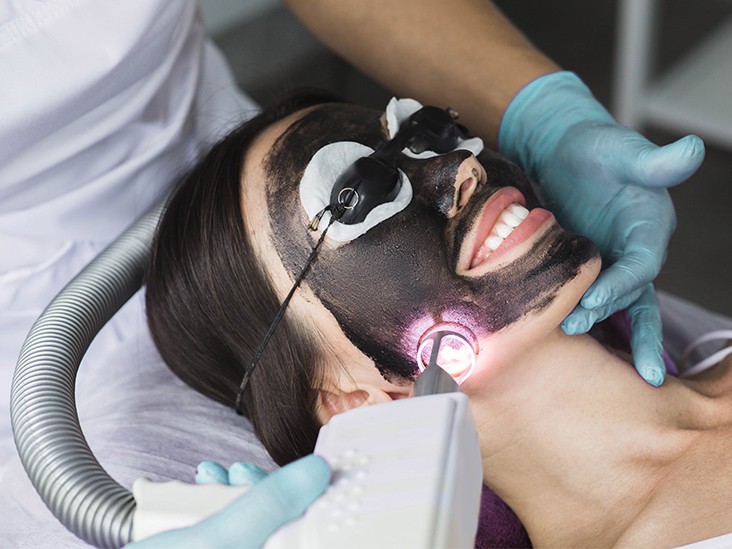Skin Pigment laser treatment
skin pigment laser treatment

Skin Pigmentation :
Skin pigmentation is characterized by either an abnormal abundance or lack of melanin in the skin. The condition takes place within skin cells called melanocytes, which produce certain amounts of melanin or pigment that give us either a lighter or darker complexion. When a pigmentation disorder occurs, it is usually in reference to three conditions known hyperpigmentation (darkening skin), hypopigmentation (lightening skin), and depigmentation (complete lack of skin colour). Oftentimes, these conditions are harmless but require protection from environmental elements that could cause further damage. However, many individuals who experience forms of skin pigmentation wish to have it treated for cosmetic purposes.
There are a variety of treatments for skin pigmentation, a lot of which can be done at home. Making face packs is a very popular home remedy treatment option. The orange paste face mask is a very useful treatment option when it comes to skin pigmentation.
Grate the skin of an orange and make a paste/gel with a few teaspoons of milk. Leave it on for half an hour and then massage gently and wash it off with warm water. Exfoliate your face at least 3 to 4 times a week with this paste.
Exfoliation encourages cell renewal and removes the dark blotches. Aloe vera is also very helpful when it comes to lightening dark spots on the skin. Aloe vera contains mucilaginous polysaccharides that can effectively lighten dark spots.
Sometimes, a skin infection, blisters, tan, sunburn, other burns or other trauma to your skin, may cause a decrease or increase of pigmentation in the affected area. These pigment alterations can be reversed and home remedies work very well for such conditions. Grind a few mint leaves and mix them with water to form a paste. To lessen dark pigmentation, apply the paste to the melanin spots and rinse it off after 15 minutes.
Apart from these home remedies, laser skin pigmentation removal treatment is a very popular option as well. Laser treatment is one of the most advanced treatments for removing unwanted pigmentation on the skin such as age spots, sun spots, and freckles.
Chemical peels are an exceptional choice for the treatment of hyperpigmentation. These peels are specifically formulated to help even out the overall skin tone and treat hyperpigmentation, fine lines, and wrinkles while leaving the skin hydrated. Skin needling is highly effective for treating hyperpigmentation in dark skin colours.
This multitasking treatment creates rejuvenating microchannels into the skin to promote a more balanced and normalized cellular function. As melanocytes are directly targeted, a repair and corrective process encourage an even skin tone creating a radiant appearance.
Skin pigmentation occurs when the body produces excess melanin, resulting in uneven patches on the skin. This is a cosmetic defect, and more often than not, it does not cause any pain or discomfort. It is only a source of annoyance. Anyone who suffers from skin pigmentation can go in for skin pigmentation treatments to regain the proper appearance of the skin, but it is not mandatory.
Skin pigmentation is more a cosmetic problem than a disease, so getting treatment for it is not mandatory. If you still want to get treatment, starting out with home remedies is an option. There is no need to directly opt for laser treatment.
Laser skin pigmentation treatments have strict post-operation guidelines that are mandatory for patients to follow. Skin upon which the laser treatment has been done will often appear red and possibly slightly swollen for the first 24 hours, so it is advised to avoid applying makeup or fragranced skin products, to avoid excessive sun exposure, and to use a sunscreen of 30 SPF or higher if you must go outdoors.
Avoid any trauma to the skin for up to 2-5 days, such as bathing with very hot water, strenuous exercise, or massage. Moreover, any additional cosmetic procedure, such as tweezing, waxing, bleaching or chemical peels, has to be avoided for at least up to 4 weeks after the treatment.
Laser skin resurfacing recovery and results vary depending upon the type of laser that is being used and the size of the area you wish to have treated. The most invasive treatments may produce enormous improvements but may require an extended recovery time of multiple weeks. A gentler laser skin rejuvenation treatment may reduce the appearance of some imperfections and may require little or no downtime.
If the patient follows home remedies for treating skin pigmentation, there are no side effects involved. However, if the patient opts for laser skin pigmentation treatment, then there are a number of side effects involved.
Lasers are effective for the treatment of hyperpigmentation but are not free of side effects.. Common side effects include redness of the skin, swelling of the treated area, and moderate irritation similar to the feeling produced by a mild sunburn. In rare cases involving laser skin resurfacing, side effects such as burning, scarring, or a change in the pigmentation of the skin have occurred.
Damage to your eyes can occur when lasers are used improperly during facial hyperpigmentation treatments; laser contact with your eyes can cause burns from laser exposure that can result in permanent blindness. Also, lasers that create extreme heat can cause your skin and tissue to heat up to damaging temperatures causing redness, blistering and burning.

